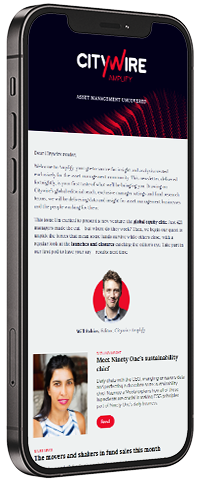There might be light at the end of the tunnel, but it ain’t here yet.
How to pitch your funds to clients

Latest Newsletter
Value stance rewards managers with first AAA rating
The year comes to a close with a host of managers gaining their AAA wings.
Real Life: A cheaper, smarter way to fly business to the US
Companies are clamping down on travel costs. Here’s how to travel in comfort while keeping the expenses department happy.
Community
Right, Mr/Ms salesperson; you’ve got the fund manager meeting and you have one chance to get it right.
Who better for advice on what to do (and not do) than Europe’s leading professional fund buyers? So we spoke to them.
The seven golden rules – print these out
- Bring your best idea first.
- Focus on your real USP.
- Listen to the analyst’s questions.
- Macro matters – but do not spend too long on it.
- Sales priorities should not set the agenda.
- Do not be an ESG bore.
- Do not chase afterwards, but follow up promptly when asked.
It may all sound obvious, but a lot of people are clearly not getting it right.
Best idea first, don’t bring all your funds
‘They should always pitch their flagship funds and also listen to a simple question: what are my needs?’ says Susanne Bolin Gärtner, head of fund selection at Danske Bank.
‘Sometimes the asset manager will pitch the whole range of funds and, of course, I won’t pick all because I’m fortunate enough to be able to cherry-pick the best ones from each manager. That’s why it’s better to come with the best ideas directly at the start of the meeting.’
Think structure, and focus on real USPs
Every asset manager plans out how they want to structure the meeting, right?
Apparently not, according to Peter Reis, head of fund research at Ifsam. For him, defining a fund’s competitive edge is central to that structure.
‘The manager has to let the selector know what is important about the fund. What are its unique selling points? Because as a selector it’s always difficult to separate the funds from each other, especially in specific segments,’ he says. ‘So it’s about: what is the diversifying factor of that fund? What is the specific competitive edge of these funds? That’s the most important thing.’
Like Bolin Gärtner, he says dealing with questions in the right way is essential. ‘For good manager meetings you also have to be transparent; you have to be open to questions from selectors and give them honest answers. But they have to be quick and meaningful answers, which we can take away and use.’
Where it goes wrong, says Reis, is when the meeting is unstructured. ‘From my experience that is often when they spend too long on the macro view. As selectors, we are interested in what the fund is about, what the fund managers are doing and what is the fund’s competitive advantage, not the macro story.’
Macro must be there, but not too much…
But wait – before you ditch the macro part of the presentation completely, read this next section and think about the balance.
The head of fund selection at one family office tells us: ‘You can’t ignore the macro.’
‘We hear so many managers say they are bottom-up or their ideas are completely uncorrelated with the markets, but I think: how can they be?’
‘At Citywire’s Berlin conference, we heard about geopolitics, Ukraine and the end of globalisation. I find it difficult to think a fund manager can invest completely immune to all of them. I would like them [fund managers] to address it, and not just say it doesn’t matter. That would be a problem for me, as we have heard for many years about bottom-up and now it feels unrealistic.’
… and don’t put sales priorities first
Luca Anzola, head of multi-manager and alternative assets at Fideuram, also wants to hear macro views, but he also warns against letting sales priorities override everything else.
‘Sometimes during meetings and presentations some fund managers seem to follow a blueprint that is functional to their commercial narrative but that, on the other hand, does not provide enough insight on the strategy and the portfolio,’ he says.
‘I like open discussions with interaction and confrontation on both the macro view and on the portfolio composition. I think that the portfolio manager should be transparent in communicating their real view of the market even if this doesn’t necessarily coincide with the short-term commercial focus.’
Avoid ESG overkill
On to the hot potato that is ESG. In general, we find fund buyers are committed to the principles of sustainable investment. But that does not mean it’s all they want to hear about, Patrick Roefs, head of fund offering and selection at Julius Baer, explains.
‘In earlier times a fund manager talked about the different markets and what countries or sectors to favour or avoid. Nowadays, managers spend 90% on explaining the ESG process and 10% on markets – if time allows.’
‘If all managers focus on ESG because they think they have to, it gets boring.’
Make the manager available
Despite years of fund selector pressure, access to fund managers remains a bone of contention. But Juan Hernando, head of fund selection at MoraBanc in Spain, says it’s getting better.
‘Both asset managers and ourselves need more transparency,’ he says. ‘So, from our side, we need more access to the managers. They have understood that, and I would say that it’s part of the due diligence process.
‘It’s something that is required before we make the investment, we make sure that we will have access, that we have good information about the portfolios, explanations about the performance, and explanations of what’s going on in the category as a whole. That is important in a meeting. It’s something that I think that is improving.’
Overall, Hernando has a positive view of his interactions with fund providers. ‘In general terms, we have no complaints, and we have great access from the asset managers,’ he says.
Wait, don’t chase!
‘A bad manager meeting is not in the room, but afterwards,’ says Bolin Gärtner. ‘By that I mean, they shouldn’t just continue chasing me if I’ve said thank you. So, listen to what needs I have and stay in contact, but to the times we agreed.’
However, where follow-up information is requested, then you’d better be quick. ‘If I would have any kind of requirements, it would be to reduce the time, the delay between the end of the month and the reports of the managers,’ says Juan Hernando.
Additional reporting by Chris Sloley, Daniel Ruiz Hernandez and Siri Christensen.
Amplify’s ex-fund manager columnist David Roberts recently wrote about his experiences leading pitches and the effectiveness of teamwork. Read it here.
Latest Newsletter
Amplify Issue 30: The fund groups topping the tree
We analyse which groups have had the biggest inflows and outflows in 2022, look at managers achieving their first AAA ratings, and hear from Rob Kyprianou on why regulation gets it back to front.
Amplify Issue 29: Red hot: 2022’s private market hiring spree
2022 has been a hot year for private markets, but are asset managers putting the brakes on their expansion efforts? Plus, we look at how the bear market has affected launches this year and look at how firms can better communicate their brand values.
Amplify Issue 28: Fill your ESG product gaps
We hear from fund buyers on what they’re looking for from an ESG fund, find out what Neuberger Berman is plotting in the alts world, and learn the winners of Citywire’s Gender Diversity Awards.
Community
